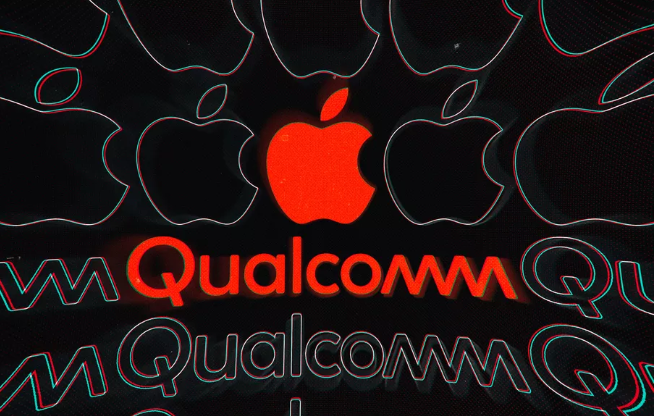 1781
1781
 2019-04-18
2019-04-18
On the second day of their blockbuster trial, Apple and Qualcomm announced that they had reached a settlement and would “dismiss all litigation between the two companies worldwide.” It’s a surprisingly amicable result, especially considering the two years of legal battles that led up to it. But the publicly announced details have left some major questions about what happened and the big implications for Apple’s first 5G phone.
Apple first announced it was suing Qualcomm back in January 2017 over allegedly unfair patent fees for smartphone modems, after which the two companies got to work taking pot shots at one another. Qualcomm attempted (with some success) to get iPhones banned in Apple’s key markets over patent infringements, and it even claimed that Apple had stolen its proprietary technology and given it to its main competitor, Intel.
Now, Apple has agreed to make a payment to Qualcomm for an undisclosed amount, and the two companies have agreed to a six-year global patent licensing deal that could be extended by two more years. The deal also includes terms for Qualcomm to supply Apple with chips.
Following the news of the settlement, Intel announced that it would be exiting the 5G smartphone modem business. Intel was set to be Qualcomm’s biggest competitor in the area. That’s quite a coincidence.

All of the litigation has now been dropped, but there’s still a lot we don’t know about the deal or how their new relationship is going to work in the future. Here are our five biggest questions:
Why did Apple suddenly choose to settle?
For the last two years, Apple has acted like a company that was prepared to go all the way in its fight against Qualcomm. It withheld all royalty payments to Qualcomm while the litigation was ongoing, it switched to using Intel’s modems exclusively for the iPhone XS, and it started shopping around for other modem suppliers. Back in November, Qualcomm CEO Steve Mollenkopf said that the two companies were “on the doorstep of finding a resolution,” only for Apple’s attorney to respond saying that “there haven’t been talks in months.” Given the animosity that’s built up between the two companies, it’s strange that the lawsuit would fizzle out on its second day. What happened, or was about to happen, that made Apple drop everything and agree to a settlement?
How did Intel factor into Apple’s decision?
Hours after Apple and Qualcomm announced their settlement, Intel said that it would exit the 5G mobile modem business. It’s highly unlikely that announcing this on the same day as the settlement was a coincidence. Over at Daring Fireball, John Gruber theorizes that either Apple settled with Qualcomm because Intel was getting out of the 5G smartphone modem business or that it happened the other way around and Intel exited the market after Apple and Qualcomm settled. Gruber guesses that it’s the former, but Bloomberg says the opposite, suggesting that Apple had already decided that Intel’s 5G modems weren’t up to snuff.
What are the terms of the deal?
We know that the agreement will contribute $2 a share to Qualcomm’s earnings, but we don’t know the specifics of how much Apple has agreed to pay now, or how much it will pay in the future for Qualcomm’s chips and patents. An exclusivity deal on modems is unlikely, given that the EU fined Qualcomm $1.2 billion for a similar agreement it had with Apple in the past because it locked other chipmaking competitors out of the market. But even if the new deal doesn’t demand complete exclusivity, it could theoretically still include other commitments from Apple, which may impact which chipsets it decides to buy. In the past, Apple has split modem orders between Qualcomm and Intel.
When will we see the first 5G iPhone?
Currently, the majority of 5G smartphones that have been announced, including the Samsung Galaxy S10 5G, use modems from Qualcomm, and it seems like Apple will have few options other than to join them if it wants to release a 5G iPhone anytime soon. With just five months to go until Apple is due to release this year’s iPhones, it’s unlikely that it will have such a 5G modem integrated in that time, leading Bloomberg to predict that we’ll see our first 5G phone from Apple in 2020. Honestly, the most surprising thing here is that, despite everything that’s happened, this timing is more or less unchanged from what we were hearing back in December. Apple is rarely the first to embrace new technologies, but 2021 would be late to release a first 5G phone, even by its standards.
When will Apple build its own 5G modems?
Apple doesn’t want to solely rely on Qualcomm for its 5G modems. We already know it’s had conversations with Samsung and MediaTek, and Huawei has said it’s “open” to selling chips to the company (although specific talks between the two companies have yet to take place). But in the longer term, Apple might be planning to develop its own 5G chips, which could be helped by buying Intel’s modem IP now that Intel’s getting out of the business. One analyst quoted by Bloomberg said that Apple might be ready to manufacture its own modems in as few as three years.
The answers to at least some of these questions will become clear over time. And as far as legal concerns go, Qualcomm isn’t out of the woods just yet. We’re currently awaiting a judge’s decision about a separate lawsuit brought by the Federal Trade Commission, and the result could have big implications for the licensing arrangements between the two companies. But the internal decisions that led to yesterday’s surprise announcement may never become public, even though the deal’s aftermath will shape the smartphone modem market for years.
Source: theverge